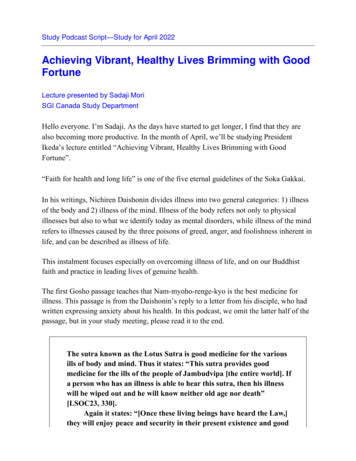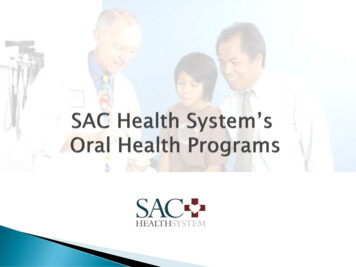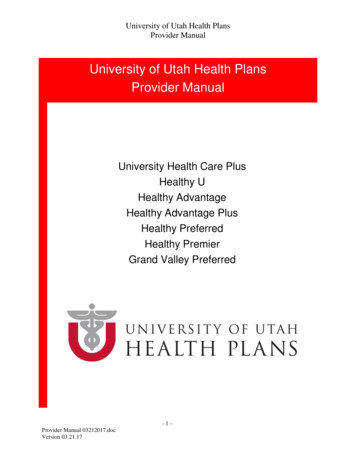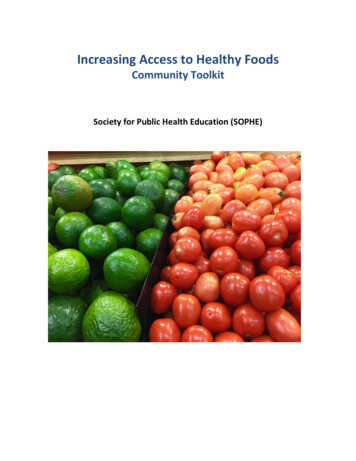
Transcription
Study Podcast Script—Study for April 2022Achieving Vibrant, Healthy Lives Brimming with GoodFortuneLecture presented by Sadaji MoriSGI Canada Study DepartmentHello everyone. I’m Sadaji. As the days have started to get longer, I find that they arealso becoming more productive. In the month of April, we’ll be studying PresidentIkeda’s lecture entitled “Achieving Vibrant, Healthy Lives Brimming with GoodFortune”.“Faith for health and long life” is one of the five eternal guidelines of the Soka Gakkai.In his writings, Nichiren Daishonin divides illness into two general categories: 1) illnessof the body and 2) illness of the mind. Illness of the body refers not only to physicalillnesses but also to what we identify today as mental disorders, while illness of the mindrefers to illnesses caused by the three poisons of greed, anger, and foolishness inherent inlife, and can be described as illness of life.This instalment focuses especially on overcoming illness of life, and on our Buddhistfaith and practice in leading lives of genuine health.The first Gosho passage teaches that Nam-myoho-renge-kyo is the best medicine forillness. This passage is from the Daishonin’s reply to a letter from his disciple, who hadwritten expressing anxiety about his health. In this podcast, we omit the latter half of thepassage, but in your study meeting, please read it to the end.The sutra known as the Lotus Sutra is good medicine for the variousills of body and mind. Thus it states: “This sutra provides goodmedicine for the ills of the people of Jambudvipa [the entire world]. Ifa person who has an illness is able to hear this sutra, then his illnesswill be wiped out and he will know neither old age nor death”[LSOC23, 330].Again it states: “[Once these living beings have heard the Law,]they will enjoy peace and security in their present existence and good
circumstances in future existences” [LSOC5, 136].And again: “All others who bear you enmity or malice will likewise bewiped out” [cf. LSOC23, 329] (WND-2, 747; “On the Importance ofthe ‘Expedient Means’ and ‘Life Span’ Chapters”)Sensei begins by describing the importance of chanting sincerely for and encouragingthose who are suffering, including those who are ill, just as Nichiren Daishonin does. Hesays,As practitioners of Nichiren Buddhism, we engage in courageous and inspiringdialogue that seeks to relieve suffering and impart joy, awakening suffering people totheir inherent Buddha nature. We strive earnestly to help them revitalize their lives,change poison into medicine, and take the first step in their human revolution.In the Gosho passage, the Daishonin states that the Lotus Sutra is good medicine for thevarious ills of body and mind, and cites a passage from the Lotus Sutra; “If a person whohas an illness is able to hear this sutra, then his illness will be wiped out and he will knowneither old age nor death”. Of course, none of us can escape from the cycle of aging,illness and death, which we all go through. But illness can cause us to feel defeated anddespair. From the point of view of Buddhism, the aspect of illness that robs us of ourstrength and life force is the devil of illness. Our Buddhist practice enables us to wipe outthe devil of illness. Similarly, the phrase “will know neither old age nor death” means theunwavering life state of Buddhahood that is not destroyed by the sufferings of aging anddeath. The unshakable and undeterred state of life we attain extends not only to this lifebut also to the next. Sensei says,As we advance in years, we will grow ever more vibrant in spirit, and the flame of ourfaith will burn stronger, enabling us to bring our lives to a magnificent close [T]helives of those who dedicate themselves to kosen-rufu will move along a pathoverflowing with good fortune and benefit, not only in the present but throughouteternity.Sensei then draws our attention to the phrase “If a person who has an illness is able tohear this sutra”. Hearing the Lotus Sutra is not just to hear it, but to chant daimoku andencourage others to do the same. He says,The key lies in chanting Nam-myoho-renge-kyo with single-minded faith in the2
Gohonzon and teaching others to do the same. When we listen to and enable others tohear this powerful sound of Nam-myoho-renge-kyo—which the sutra describes as“this good medicine”—the incredible beneficial power of the Mystic Law flows forthin our own and everyone’s life.As for chanting daimoku, he encourages us to chant like a noble steed galloping throughthe sky. He often uses this expression. In this article, he says,Prayer creates momentum. Our chanting should be vigorous. Together, let us chantrefreshing and vibrant daimoku—our voices resounding in a rhythm like a noble steedgalloping through the heavens—and forge ahead in our efforts for kosen-rufubrimming with life force and energy.I think it’s good to keep in mind that Sensei never defines the ideal speed of the chanting.It depends on how old you are, how many people you are chanting with and so on.Now let’s move onto the second Gosho passage, which teaches that the benefits wereceive point to a state of indestructible happiness. The text contains some Japanesewords, and is difficult to follow in a podcast; you may want to look at the New Centuryor download the podcast script.Point One, regarding the Benefits of the Teacher of the LawThe Record of the Orally Transmitted Teachings says: The words“teacher of the Law” mean the teacher of the Law who carries out thefive practices. The word “benefits” (kudoku) means the reward that isrepresented by the purification of the six sense organs. In general wemay say that now Nichiren and his followers, who chant Nam-myohorenge-kyo, are carrying out the purification of the six sense organs.Hence they are acting as teachers of the Law of Myoho-renge-kyo andpossess great virtue (toku).The element ku [meaning “merit”] in the word kudoku [benefits]means good fortune or happiness. It also refers to the merit achievedby wiping out evil, while the element toku or doku [meaning “virtue”]refers to the virtue one acquires by bringing about good. Thus the3
word kudoku means to attain Buddhahood in one’s present form. Italso means the purification of the six sense organs. You shouldunderstand that to practice the Lotus Sutra as the sutra itself directsis to carry out purification of the six sense organs. (From The Recordof the Orally Transmitted Teachings, pp. 147–48)The passage teaches that a teacher of the Law, or those of us who chant Nam-myohorenge-kyo and spread the teaching receive the benefits of attaining Buddhahood in ourpresent form and of purifying the six sense organs. The “six sense organs” correspond toour five sense organs and our mind. Their purification makes it possible to apprehend allthings correctly, free from the influence of deluded impulses. As a result, it allows us toperceive, judge, and act correctly. It allows us to reach out with compassion to those whoare suffering, in accord with the principles of Buddhism and to strive together with themfor the happiness of all. In terms of the theme of this instalment, the Gosho passageteaches that as we polish our lives, we can see sickness and death as innate aspects of lifeitself, transforming them into opportunities for creating value.After explaining the Gosho passage, Sensei stresses that those who dedicate themselvesto kosen-rufu, those who live the bodhisattva way of helping others become happy willaccumulate imperishable treasures of the heart. He says,Viewed from the perspective of faith and a life dedicated to the bodhisattva way, thegreater the hardships one has experienced, the greater one’s mission. It is a way of lifethat cherishes the “treasures of the heart as the most valuable of all” (cf. WND-1, 851).Instead of focusing on the “treasures of the storehouse” or the “treasures of the body,”let us strive to fulfill our mission with pride and optimism, accumulating imperishabletreasures of the heart. If we advance with the lofty aspiration of our vow for kosenrufu, we can amass good fortune and benefit beyond measure.If you’re a facilitator, you can ask members in your district who have remained strongwhile battling illness or any other hardships, to share how they maintain strong faith.They are great examples of living lives of genuine health, which is the key to thisinstalment. If you are not the person in charge of the meeting, you can contribute to itsgreat success by bringing in a question, sharing an experience related to a key point,encouraging people to read the material in advance, or making a virtual home visit forthose who missed the meeting. The success of a meeting does not depend on the4
facilitator alone.In his concluding remarks, Sensei quotes a passage from “On Establishing the CorrectTeaching” and extends the concept of health beyond the health of individuals to theperspective of creating healthy, supportive societies, and calls for their construction. Letus engage in dialogue with the conviction that our individual Buddhist dialogue isdirectly connected to establishing the correct teaching for the peace of the land.I hope you all have a great discussion-based study meeting where everyone takes away atleast one key point that they can put into practice. If you have any questions, please don'thesitate to send them to us at study@sgicanada.org. Bye for now.5
rufu, we can amass good fortune and benefit beyond measure. If you're a facilitator, you can ask members in your district who have remained strong while battling illness or any other hardships, to share how they maintain strong faith. They are great examples of living lives of genuine health, which is the key to this instalment.










